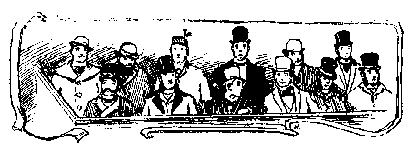Gilbert & Sullivan Opera
A History and a Comment
by H. M. Walbrook
CHAPTER III.
W. S. PENLEY'S DÉBUT.

The second appearance of the duumvirate was at the Royalty Theatre on March 25th, 1875, when the dramatic cantata, Trial by Jury, was acted for the first time, as an after-piece to Offenbach's three-act comic opera, La Périchole. On that night began the long series of absolute triumphs for Gilbert and Sullivan. The new operetta was fortunate in following a French opera, and particularly in following one so very French as Offenbach's merry fantasy. Steeped in English "point" and comicality, it took London by storm, and a run which was only expected to last a few weeks went gaily on to nearly the end of the year. The picture of an English Court of justice in which the jurymen in a breach-of-promise action ostentatiously peruse the morning papers while the Defendant's case is being submitted; in which the judge kindly offers the Court a sketch of his own personal obliquity before passing to the business of the day; in which the Defendant warbles cheerfully of his fickleness to his own accompaniment on a beribboned guitar; in which the Plaintiff trips into Court wearing her full bridal trousseau and escorted by a bevy of daintily attired bridesmaids, and in which the judge flirts outrageously with her and finally brings the proceedings to a close by offering to marry her himself — all this, set to music as witty and brilliant as the words, offered a new sort of ecstasy to London playgoers.
The original cast had been carefully selected. Tall and pretty Miss Nelly Bromley impersonated the Plaintiff; Mr. Walter Fisher, a tenor with a charming voice, was the Defendant; and the composer's brother, Mr. Fred Sullivan (for whom the part had been written and composed) impersonated the Judge. After a week or two a new name appeared on the programme, placed against the tiny part of the Foreman of the Jury. The new arrival had only a few words to sing (except in the choruses; but his facial expressions and his gestures were so extraordinarily droll that he was soon causing as much laughter as all the rest of the cast put together. Indeed, old playgoers who remember him have told me that he "made the success" of the production. The name of the unknown actor was W. S. Penley, who was to become so well known by his acting in "Falka," "The Private Secretary," and Mr. Brandon Thomas's famous farce, "Charley's Aunt."
Like many popular comedians, from honest John Liston of Lamb's time down to the admirable Mr. Blakeley, who was so droll an impersonator of comic old men in the days of Charles Wyndham in Farce at the Criterion, Mr. Penley possessed one of those countenances which it is almost impossible to contemplate without laughing. He was also endowed with a voice of which every intonation on the stage could create an equally irresistible comic effect. In short, he was a born comedian, and Art had comparatively little to do with his remarkable success. A guest at his home in the country once found it exceedingly difficult to keep his countenance while his host was reverently saying grace at the family board. Similarly a passerby was once convulsed with laughter on seeing and hearing a middle-aged gentleman in Chelsea, who happened to be Mr. Blakeley, giving instructions in his most serious manner to a house-painter on a ladder.
Trial by Jury, which occupies less than an hour and which is the only Gilbert and Sullivan opera in which the entire text is sung, satirizes the procedure in an average breach of promise, and also the insincerity which may sometimes underlie the pose of "respectability." Everything done or sung is ludicrous, and yet beneath it all lies a recognisable substratum of truth. The piece is a riot of laughter. The judge's ditty, "When first, my friends, I was called to the Bar," is the best-known comic song in the English language. In none of the operas is the genius of Gilbert as an inventor of "comic business" more daringly and irresistibly exhibited. One can see the piece again and again and discover fresh strokes of comicality. Its place in the Gilbert and Sullivan repertory is as secure as ever; and whatever reforms may be hereafter effected in this particular department of the King's Bench Division, Trial by Jury will probably long continue to be one of the English-speaking world's refreshments.